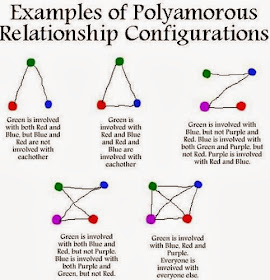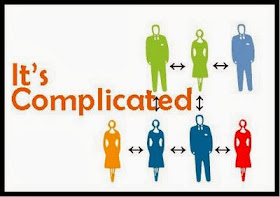Swinging, Swapping, Polysexuality, Polyamory-Polyamorus (or Poly) relationships
Researchers estimate that as many as 5 percent of Americans are currently in relationships involving consensual nonmonogamy — that is, permission to go outside the couple looking for love or sex.
The boundaries in these relationships are remarkably varied, with some couples negotiating one-off "swinging" or partner-swapping experiences and others forming stable bonds among three, four or five partners simultaneously. The latter is a version of polyamory, relationships in which people have multiple partnerships at once with the full knowledge of all involved.
Swinging or partner swapping is a non-monogamous behavior, in which both partners in a committed relationship agree, as a couple, for both partners to engage in sexual activities with other couples as a recreational or social activity.
Swinging can take place in a number of contexts, ranging from a spontaneous sexual activity at an informal social gathering of friends to planned or regular social gatherings to coupling with like-minded couples at a swingers' club.
The term wife swapping, once considered to be equivalent to "swinging", is now criticized as being androcentric and not accurately describing the full range of sexual activities in which couples may take part, but the term continues in use, and reflects the origins of the concept whereby husbands were viewed as initiating an informal partner swap.

In our modern culture, swinging, or "mate-swapping" -- engaging in sexual activities with people outside your marriage -- is mostly seen as strange or deviant. But is it? And is it always a bad thing, or a sign of "trouble" in a marriage? Free love and sexual experimentation were pushed to the forefront in the 1960s, and we have all heard of the "key parties" of the 1970s.
The current studies on swinging do not vary much from the studies of the past: married couples are still swinging for the same reasons, and both the benefits and negative effects don't seem to have changed much at all over the decades.
So who is doing all of this swinging? Studies have shown that demographically, swingers cut across all political identifications, come from the middle- to upper-class, have a higher degree of education, have white-collar jobs and are white and middle-aged.
The benefits of swinging include increased marital satisfaction. In a 2000 online survey of 1,092 swingers, Bergstrand and Williams found that communication, independence and relationship-revitalization were reasons people gave for why they continued to swing. The swingers studied also seemed to have higher general satisfaction and more excitement in their lives than non-swingers.
Polyamory, meaning "many" or "several" "love", is the practice, desire, or acceptance of having more than one intimate relationship at a time with the knowledge and consent of everyone involved. It is distinct from swinging (which emphasizes sex with others as merely recreational) and may or may not include polysexuality (attraction towards multiple genders and/or sexes).
Polyamory, often abbreviated as poly, is often described as "consensual, ethical, and responsible non-monogamy." The word is sometimes used in a broader sense to refer to sexual or romantic relationships that are not sexually exclusive, though there is disagreement on how broadly it applies; an emphasis on ethics, honesty, and transparency all around is widely regarded as the crucial defining characteristic.
The term "polyamorous" can refer to the nature of a relationship at some point in time or to a philosophy or relationship orientation (much like gender or sexual orientation). It is sometimes used as an umbrella term that covers various forms of multiple relationships; polyamorous arrangements are varied, reflecting the choices and philosophies of the individuals involved.

The concept of polyamory is often misunderstood by the general public and the media. Tell someone you are polyamorous and it conjures images for the average person of swing parties and clubs with people getting it on in dark corners or polygamous families with men controlling unhappy sister wives and lots of children. These images perpetuated by Hollywood are not polyamory, nor do they even represent the swing lifestyle or polygamy accurately. When it come to families and polyamory, there is even more confusion. Most people don't understand people when they say their children have been raised in a poly family.
Society largely associates swinging and polyamory as cheating. According to the dictionary, cheating means "fraud, deceit, swindling." In other words, cheating is to convey through deliberate action the impression that one is of a particular nature while one is, in fact, something quite different. What this boils down to with polyamory is that polyamorous people do not tell partners, lovers, or prospective members of those groups that they are monogamous when in fact they are not -- nor do they allow these people to assume they are monogamous, regardless of how convenient or personally advantageous such assumptions might be.
The words "honest", "negotiate", "communication" and "being out" occur frequently in discussions of how polyamory usually works.

As you can see, just as in any BDSM relationship, complete honesty, negotiation, and communication seem to be key in having a long lasting and strong relationship. During my research, I came across many swingers and poly families that had been very happy for decades. I also found others that didn't last that long.
Being a couple, swingers, or poly is no guarantee that you will always have a happy ending or continuation in your relationship.
So, now that you know the difference in swinging and polyamory, what are your thoughts? Let me hear from you below!










I love leading the swinger lifestyle. My man has been very curious of poly relationships. Thank you for the info!! We have always had very open communication of guidelines and epectations I think this might be something to bring more fullfillment to us as a couple and individuals. Everyone wants to be happy and being true to ur desires is the best way!!
ReplyDeleteThat's exactly right! As long as it's not hurting anyone and everyone is on the same page, it's a go!
DeleteIt was nice to see an educated, positive, article on swinging and poly relationships. It may be the one type of relationship as or more misunderstood than BDSM.
ReplyDeleteYou are very right. Many people think that having a multi-person relationship is cheating. They have no clue, nor do they want to take the time, to educate themselves about the facts of a real relationship of this nature.
DeleteI have identified as polyamorous for several years now, but haven't had a truly poly relationship yet. So many people I meet are intimidated by not having someone all to themselves that they say no thanks as soon as I tell them I'm not monogamous. As I've explored my reasons for identifying as poly, I've been able to have some really positive conversations about it. Your article is a great resource to include in discussions!
ReplyDeleteThank you. Being Poly is definitely a choice that can put some people off. But, it's great that you are confident with yourself to realize what you want.
DeleteWonderful swing,
ReplyDeleteI really like that type of swinglifestyle,
https://www.spicymatch.com